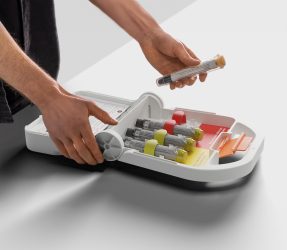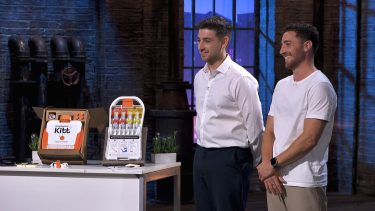Putting life-saving adrenaline within reach: Kitt Medical’s allergy response mission
- Like
- Digg
- Del
- Tumblr
- VKontakte
- Buffer
- Love This
- Odnoklassniki
- Meneame
- Blogger
- Amazon
- Yahoo Mail
- Gmail
- AOL
- Newsvine
- HackerNews
- Evernote
- MySpace
- Mail.ru
- Viadeo
- Line
- Comments
- Yummly
- SMS
- Viber
- Telegram
- Subscribe
- Skype
- Facebook Messenger
- Kakao
- LiveJournal
- Yammer
- Edgar
- Fintel
- Mix
- Instapaper
- Copy Link
Posted: 24 April 2025 | Ben Cornwell | No comments yet
For this month’s Ingredients for Change and to mark Allergy Awareness Week, we speak to Zak Marks, Co-founder and CEO of Kitt Medical, whose personal journey with life-threatening allergies has sparked a national mission to ensure adrenaline is always close at hand, starting with schools and qualifying businesses.
Kitt Medical’s Zak Marks was five years old when he had his first severe allergic reaction. A shared knife, used for both peanut butter and butter, was enough to trigger an emergency. “That cross-contamination was enough to give me a severe allergic reaction,” he recalls. “Hives, swelling and a lot of stomach sickness.”
We want to be every defibrillator’s next-door neighbour…
At the hospital, skin-prick tests revealed he was severely allergic not only to nuts and peanuts but also to legumes – peas, chickpeas and lentils. “I was given two adrenaline pens and sent on my way,” says Zak.
It was a life-changing moment, and the beginning of years spent navigating a world that often isn’t built with allergy safety in mind.
By 2026, it is predicted that allergy will affect at least one in two people, highlighting the growing need to bridge the gap in allergy awareness and emergency response.
From university project to national rollout
In 2020, while studying industrial design, Zak developed a concept that would later evolve into Kitt Medical. “COVID happened, and this concept of something like a defibrillator, but for allergies, was constantly on my mind,” he says. Together with co-founder James Cohen, he created a basic prototype: a plastic briefcase containing adrenaline pens and a mock-up website under the name Ana.
They tested prototypes with school nurses, gathered feedback and learned quickly. “Rather than spending two years and millions of pounds on something that we thought might work and then didn’t, we started with the easiest possible thing, the minimum viable product (MVP),” Zak says. From there the product evolved, the company name changed and Kitt Medical was born.


Their wall-mounted Kitts. Credit: Kitt Medical
Their solution, the Anaphylaxis Kitt, is now a fully integrated service: a wall-mounted kit stocked with adrenaline pens and an accompanying platform that monitors expiry dates, triggers replacements and provides a CPD-accredited training course developed in collaboration with Anaphylaxis UK and allergy specialists.
And the need has never been greater: NHS data recorded 25,721 hospital admissions for anaphylaxis in 2022–23, more than double the 12,361 cases twenty years prior, representing a 108 percent increase in life-threatening allergic reactions.
Today, Kitt Medical operates in over 700 locations, including schools and qualifying businesses such as Alton Towers Resort and the Royal Albert Hall. The Kitts have facilitated the training of over 17,000 staff members and directly saved 12 lives.
Designed to be seen and used
For Zak, visibility is key. “What we want to do is achieve the same status as the defibrillator: front of mind, front of show,” he says. Too often, adrenaline pens are hidden in drawers, if they’re stocked at all. Kitt’s wall-mounted kits are designed to start conversations – not just to save lives in emergencies, but to normalise allergy safety in everyday settings.
When asked about the product’s impact to date, Zak recalled a powerful example involving an outdoor education teacher with no known allergies who was stung by a swarm of bees and went into anaphylactic shock. Crucially, she only recognised the signs of anaphylaxis because she had completed Kitt Medical’s training course. Thanks to that training – and access to the emergency kit – she was able to act quickly and safely. Without them, the outcome could have been far more serious.
The fact that someone with no allergy history could be at risk underscores the company’s wider mission: making emergency adrenaline available not just for known allergy sufferers, but for anyone who may need it.
Scaling a life-saving idea
In 2025, the company stepped into the national spotlight with an appearance on the UK television show, Dragons’ Den.


Kitt Medical co-founder’s James Cohen and Zak Marks pitching to the Dragons. Credit Kitt Medical
Zak knew that pitching Kitt Medical to the ‘dragons’ meant proving not just the life-saving potential of the product but also its strong sustainable business model.
He reflects, “It’s a very good business model and it’s run by a team with a strong vision and personal interest. And I think we knew that going in that pretty much ticks all of the Dragons’ boxes.”
The team had prepared their pitch meticulously and were heading into the den on the back of securing their first major qualifying business with occupational health, Alton Towers Resort, and a key partnership with St John Ambulance. These milestones, along with hundreds of schools using the service and their first few lives saved, provided solid proof points going into the pitch. The result was a £75,000 investment from Dragons Deborah Meaden and Stephen Bartlett.
However, the real investment may be yet to come as Zak believes the Dragons’ long-term influence will be critical in pushing the team’s mission further.
“What I’m looking forward to in the future is the ability for them to raise the profile of it to such a degree that we can push for parliamentary action, or grand-scale business involvement and partnership.”
Food labelling: the unseen risk
While Kitt Medical focuses on emergency response, Zak is also personally vocal and passionate about the shortcomings of allergen labelling. His frustration? The UK’s Top 14 allergen list hasn’t evolved alongside allergy trends.
“For me, as someone allergic to nuts and peanuts, which are Top 14, and then legumes, peas, chickpeas and lentils, which are not Top 14, I constantly experience this issue where anywhere I go out to eat, I explain my allergies and they say, ‘oh, here’s our matrix or our QR code.’
“This is helpful for nuts but most of the time this probably says ‘may contain’ and beyond that has nothing about the other [non top 14] ingredients like peas, chickpeas and lentils.
“So what help is that QR code actually giving me?
“I’ve personally heard of way more people allergic to chickpeas than I have lupin, which is a Top 14 allergen.”
That outdated framework is more than just a nuisance – it’s a barrier. According to a 2023 Anaphylaxis UK survey, 60 percent of young people with food allergies have avoided eating out due to concerns about allergen safety. Even more telling, 87.5 percent say they would leave a restaurant or food retailer if they weren’t confident in the allergen information provided.
This framework can mislead businesses into thinking they’re allergy-aware when they’re merely compliant.
He added: “Really what they’re doing is adhering to that Top 14 law and not really going that extra mile, which is: here’s all our ingredients; here’s everything we use.”
His call isn’t for new products or policies, just for transparency.
The kid with the allergy is normally the one that makes the decision of where to eat in the food group or the family. So, it’s in everyone’s best interest to include them in the decision making.”
A future of awareness and accessible adrenaline
As Allergy Awareness Week (21-28 April) shines a spotlight on the issue, Zak hopes it will help shift society’s perspective on anaphylaxis, framing it not just as an individual health condition, but as a shared responsibility.
The challenges go far beyond food labelling and emergency preparedness, they are deeply embedded in the everyday lives of allergy sufferers. Many people remain unaware of the constant vigilance required and the psychological toll of living with a life-threatening allergy. It’s not just about managing an emergency; it’s about the ongoing, often invisible struggles people face simply trying to navigate a world that wasn’t designed with their needs in mind.
However, Zak’s vision for the future is straightforward yet powerful: “The one thing I want is for a Kitt to be in every single place I ever go. We want to be every defibrillator’s next-door neighbour.”
Reach out!
As part of our Ingredients for Change series, we are always on the lookout for the next wave of innovators and unsung heroes making a difference in the food industry.
If you know of individuals, companies, or initiatives advancing food safety, pushing for regulatory change, or transforming other aspects of the industry, we’d love to hear from you.
Contact our Assistant Editor Ben Cornwell ([email protected]) with your suggestions and help us spotlight the voices and solutions shaping the future of food!
Related topics
Allergens, Contaminants, Equipment, Food Safety, Ingredients, Labelling, Packaging & Labelling, Product Development, Technology & Innovation, The consumer









